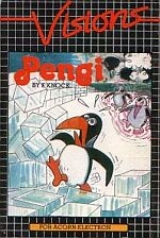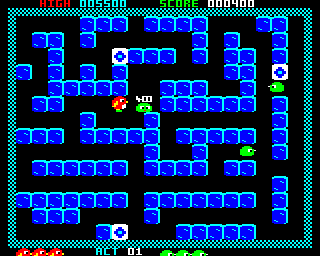
Pengi
Encyclopedia
Pengi is a computer game for the Acorn Electron
and BBC Micro
, released by Visions Software in 1984. It is based on the Sega
arcade game
Pengo.
The player takes the role of a penguin
named Pengi who finds himself in a maze
made up of ice
blocks that is surrounded by an electric fence
. If the blocks are kicked, they will slide along until they hit another block or the fence. If however, the block is already touching something else (in the direction it would slide), it breaks and disappears. Three of the blocks are special 'diamond' ice blocks which cannot break.
 The maze is inhabited by 'snow bees' that are deadly so must be avoided. They move around in a semi-random way: a bee may sometimes choose to get away from Pengi instead of chasing him (especially on early levels). The bees can be killed by crushing them with a moving ice block (bees do not stop the blocks so more than one bee can be killed with one kick) or by kicking the fence while they are touching it. This momentarily stuns them and they can be crushed by simply walking over them. Only a set number of bees are on the screen at once (e.g. 3 on level 1) but there are more (a total of 6 on level 1) which emerge from the diamond blocks as others are killed. A level is completed either by killing all of the bees or by lining up the special diamond blocks. This is the preferred way of completing the level because a huge points bonus is awarded (5,000 if they are touching the fence, 10,000 if they are not).
The maze is inhabited by 'snow bees' that are deadly so must be avoided. They move around in a semi-random way: a bee may sometimes choose to get away from Pengi instead of chasing him (especially on early levels). The bees can be killed by crushing them with a moving ice block (bees do not stop the blocks so more than one bee can be killed with one kick) or by kicking the fence while they are touching it. This momentarily stuns them and they can be crushed by simply walking over them. Only a set number of bees are on the screen at once (e.g. 3 on level 1) but there are more (a total of 6 on level 1) which emerge from the diamond blocks as others are killed. A level is completed either by killing all of the bees or by lining up the special diamond blocks. This is the preferred way of completing the level because a huge points bonus is awarded (5,000 if they are touching the fence, 10,000 if they are not).
The game continues with different coloured bees in a new maze. The number of bees on screen, the number of 'reserve' bees, the speed of the bees and the intelligence of the bees all increase on each successive level, making it much more difficult to successfully line up the diamond blocks.
As with most popular arcade games of the time, there were many other unofficial clones of Pengo released for various home computer
s. Other BBC/Electron examples include Percy Penguin (Superior Software
), Pengwyn (Postern) and more abstract interpretations like Rubble Trouble (Micro Power
) but Pengi is generally regarded as the best of its type. Electron User
(#2.04, January 1985) gave a particularly favourable review. Though at that time, it did not give out scores, the reviewer said "Visions' Pengi is far superior to any Pac Man program... The graphics are excellent as is the sound... If you're into arcade games, you will love this one."
A version of Pengi was released for the Sinclair QL Home Computer in 1985 http://www.rwapsoftware.co.uk/games.html.
Acorn Electron
The Acorn Electron is a budget version of the BBC Micro educational/home computer made by Acorn Computers Ltd. It has 32 kilobytes of RAM, and its ROM includes BBC BASIC along with its operating system....
and BBC Micro
BBC Micro
The BBC Microcomputer System, or BBC Micro, was a series of microcomputers and associated peripherals designed and built by Acorn Computers for the BBC Computer Literacy Project, operated by the British Broadcasting Corporation...
, released by Visions Software in 1984. It is based on the Sega
Sega
, usually styled as SEGA, is a multinational video game software developer and an arcade software and hardware development company headquartered in Ōta, Tokyo, Japan, with various offices around the world...
arcade game
Arcade game
An arcade game is a coin-operated entertainment machine, usually installed in public businesses such as restaurants, bars, and amusement arcades. Most arcade games are video games, pinball machines, electro-mechanical games, redemption games, and merchandisers...
Pengo.
The player takes the role of a penguin
Penguin
Penguins are a group of aquatic, flightless birds living almost exclusively in the southern hemisphere, especially in Antarctica. Highly adapted for life in the water, penguins have countershaded dark and white plumage, and their wings have become flippers...
named Pengi who finds himself in a maze
Maze
A maze is a tour puzzle in the form of a complex branching passage through which the solver must find a route. In everyday speech, both maze and labyrinth denote a complex and confusing series of pathways, but technically the maze is distinguished from the labyrinth, as the labyrinth has a single...
made up of ice
Ice
Ice is water frozen into the solid state. Usually ice is the phase known as ice Ih, which is the most abundant of the varying solid phases on the Earth's surface. It can appear transparent or opaque bluish-white color, depending on the presence of impurities or air inclusions...
blocks that is surrounded by an electric fence
Electric fence
An electric fence is a barrier that uses electric shocks to deter animals or people from crossing a boundary. The voltage of the shock may have effects ranging from uncomfortable, to painful or even lethal...
. If the blocks are kicked, they will slide along until they hit another block or the fence. If however, the block is already touching something else (in the direction it would slide), it breaks and disappears. Three of the blocks are special 'diamond' ice blocks which cannot break.

The game continues with different coloured bees in a new maze. The number of bees on screen, the number of 'reserve' bees, the speed of the bees and the intelligence of the bees all increase on each successive level, making it much more difficult to successfully line up the diamond blocks.
As with most popular arcade games of the time, there were many other unofficial clones of Pengo released for various home computer
Home computer
Home computers were a class of microcomputers entering the market in 1977, and becoming increasingly common during the 1980s. They were marketed to consumers as affordable and accessible computers that, for the first time, were intended for the use of a single nontechnical user...
s. Other BBC/Electron examples include Percy Penguin (Superior Software
Superior Software
Superior Software is a video game publisher. It was established in 1982 by Richard Hanson and John Dyson, two graduates of the University of Leeds, England...
), Pengwyn (Postern) and more abstract interpretations like Rubble Trouble (Micro Power
Micro Power
Micro Power was a British company established in the early 1980s, best known as a video game publisher but they also produced and sold many types of computer hardware and software through their Leeds...
) but Pengi is generally regarded as the best of its type. Electron User
Electron User
Electron User was a magazine targeted at owners of the Acorn Electron microcomputer. It was published by Database Publications of Stockport, starting in October 1983 and ending after 82 issues in July 1990....
(#2.04, January 1985) gave a particularly favourable review. Though at that time, it did not give out scores, the reviewer said "Visions' Pengi is far superior to any Pac Man program... The graphics are excellent as is the sound... If you're into arcade games, you will love this one."
A version of Pengi was released for the Sinclair QL Home Computer in 1985 http://www.rwapsoftware.co.uk/games.html.

